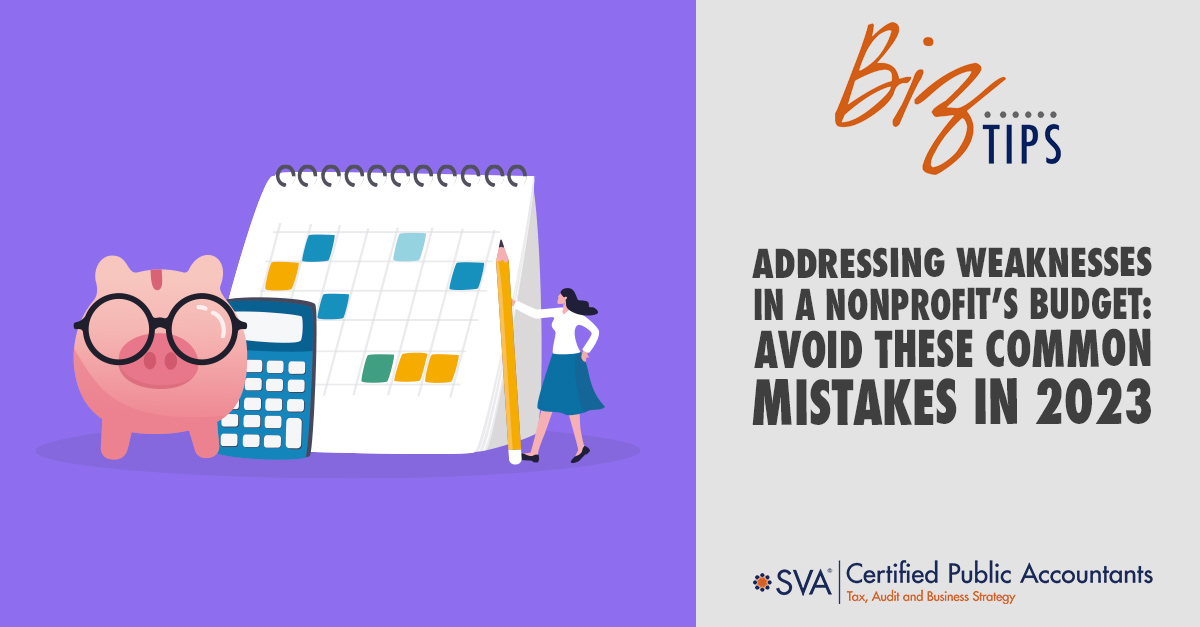Believe it or not, the new year is just around the corner. With 2023 fast approaching, nonprofits are starting their budgets for the new year.
It is easy to put the budget on the back burner or simply use the same numbers as last year, but that approach is rarely effective. Instead, now is the perfect time to determine what is working for a nonprofit and what could use some work.
Common Nonprofit Budgeting Mistakes in 2023
Below are a few common “weak areas” or mistakes nonprofits make regarding budgeting. Consider whether these weak points might be something necessary to address while creating a budget for the new year.
Not Using a Holistic Approach
Unfortunately, nonprofit budgeting is not always the most efficient practice.
In a nonprofit that uses several departments, for example, there is often very little communication among the departments. Instead, the budget is a piecemeal assortment of information derived from departmental silos.
Goals also often come from outside a particular department, such as from a board of directors, that might not always have all of the information necessary to create these goals.
Using a holistic approach to budgeting looks at the big picture. It reviews every department and encourages communication among the contingencies to create a budget that simply makes more sense.
Having a finance or accounting department gather and present information (instead of asking each section to address its own accounting needs) can provide a much better spending forecast.
Failing to Appreciate Trends
Budget forecasting involves reviewing past performance to indicate how the budget will look in the future. It reviews historical data and patterns, trends in the economy, and assumptions and circumstances that will likely affect the nonprofit during a specific budgeting period.
Spotting trends forces the nonprofit to look beyond just a year or two of prior budgets. It asks the nonprofit to gather data for several years to take a long-term view. By stepping back to look at a large amount of data, the nonprofit can spot problem areas, guide future budget allocations, and take steps toward big-picture strategic planning.
Considering Other Budgeting Options
Sometimes creating a budget is more of an art than a science. If COVID-19 has taught nonprofits anything, it has forced creativity for fundraising and budget issues. Having a “backup” plan for a nonprofit budget is never a bad idea.
Create several budgeting models as part of the plan.
- What would the budget look like if the nonprofit suddenly lost a significant source of funding?
- What expenses could be cut if donation projections are not as large as expected?
- What would the nonprofit do with a sudden, large estate donation?
Running several models will help a nonprofit be more prepared if it has to make quick adjustments.
Not Creating a Rainy-Day Fund
Even nonprofits need to have an emergency fund. Including extra savings funds in the budget is a great idea—and it is never too late to start this kind of fund. Having a backup plan if donations do not come through or if the nonprofit suddenly has a much higher need for services can mean the difference between accomplishing a nonprofit’s goals or closing its doors.
Those who are making donations will certainly appreciate that the nonprofit stockpiles some funds for emergencies. It shows good financial responsibility and foresight. Nonprofits just have to fight the urge to leave it out of the budget when they want more funds allocated elsewhere. This emergency fund is important, and the nonprofit should make it a priority.
Missing Opportunities to be Flexible with the Budget
Just because the nonprofit only creates an overall budget once a year does not mean the nonprofit is married to it. Create a four-quarter budget while leaving some room to adjust from time to time.
Altering the budget to account for changes in income or expenses can help a nonprofit plan better and use resources more efficiently. It also helps a nonprofit respond better in times of crisis or increased need.
Ignoring New and Updated Information
Copying and pasting an old budget from year to year will occasionally work, but the better practice is to account for changes yearly. This year, for example, higher inflation rates and increased lending rates may affect some line items. Even simple things like office supplies might require a budget increase.
Every nonprofit should also review any legal changes that might affect them. For the past couple of years, there have been many opportunities for financing available through the government, for example. Nonprofits might have additional funding options that provide more funds but also require earmarked spending. New funds also might trigger new reporting requirements.
Learn From Your Mistakes
Avoiding these pitfalls can help a nonprofit have an even bigger impact with its available resources. Talk to an accounting and tax professional about all of these concern areas to create a much more accurate budget for use throughout 2023.

© 2022 CPA ContentPlus

